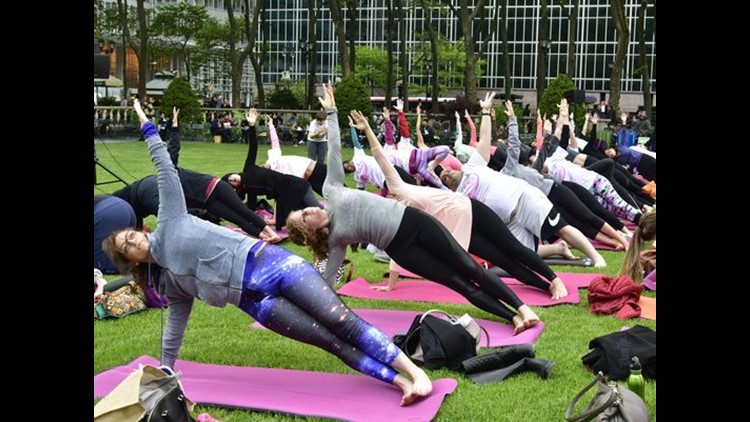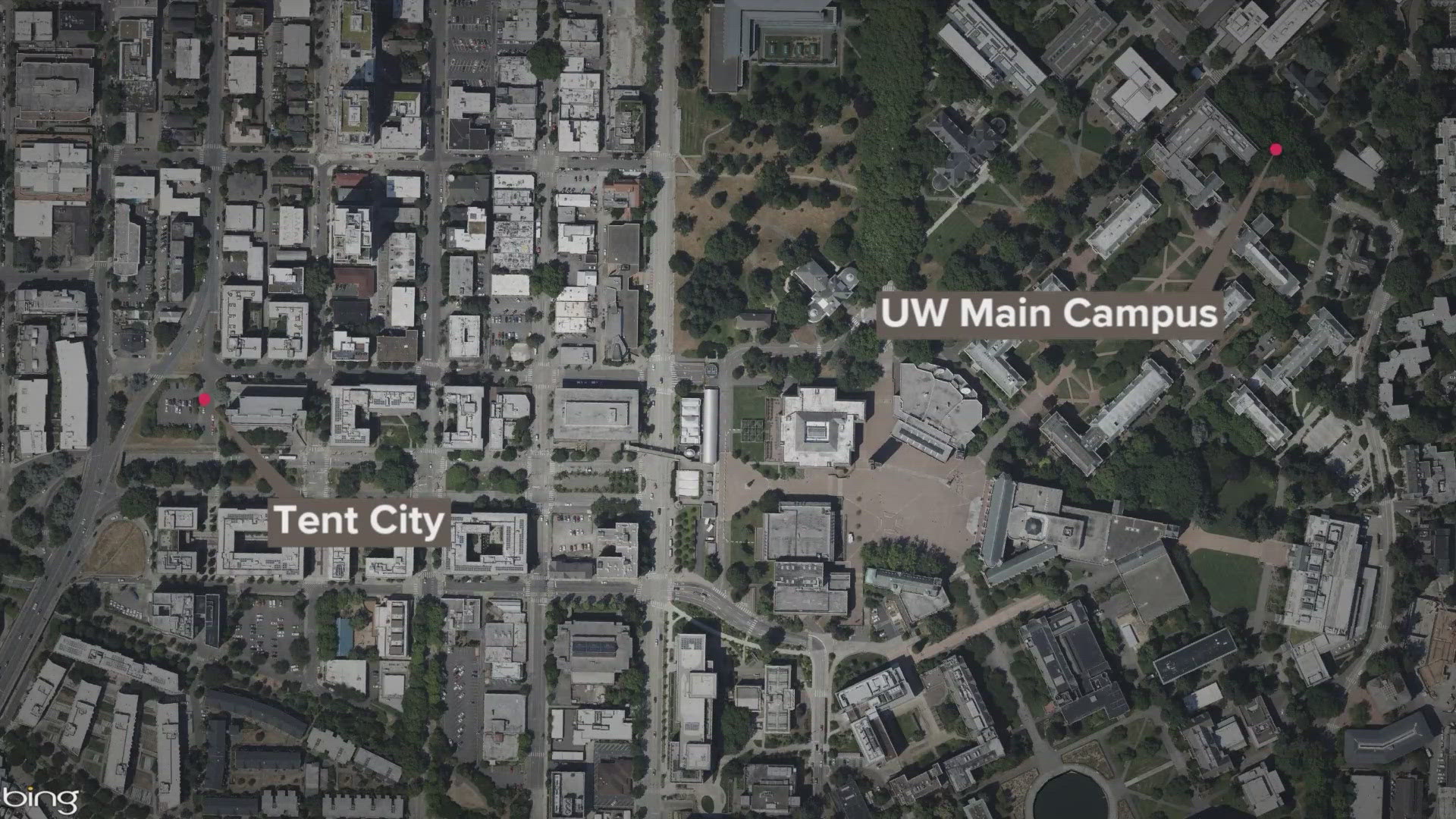President Trump’s election and the political cacophony that followed are driving waves of people to yoga and meditation, seeking a respite from the roller-coaster ride but also trying to recharge and build energy for a political pushback.
Yoga and meditation coaches say they are seeing increased enrollment and fewer dropouts from the annual "New Year's resolution" wave of signups. Part of this is stress relief — the American Psychological Association reports that stress nationwide is on the rise for the first time in 10 years.
But part of it is also meditation as resistance: Liberals see yoga as a place to reflect and recharge batteries for the political fights outside.
“This last election especially felt so tumultuous and so dividing — like there was so much angst and anger on both sides,” said Kristin McGee, celebrity yoga instructor and author of a beginner's guide called Chair Yoga. “The whole idea of yoga is to unite or to come together and to create a community. ... people are trying to find a way to come together, to try to find what is it that makes them feel connected and centered.”
Since the election, McGee said, “more and more people are coming to classes, more people are emailing me and asking me about how they can get started or asking me for private sessions.”
It is hard to find meaningful numbers on the post-election growth of yoga and meditation, in part because both fields have seen a dramatic increase in U.S. participation over the past decade. A joint study between the Yoga Journal and the Yoga Alliance found the number of U.S. yoga practitioners increased from 20 million in 2012 to 36 million in 2016, with about 72% of the participants being women.
But practitioners say the rise of Trump has clearly set a new tone for many yoga practitioners.
David Romanelli, a Los Angeles-based author and meditation teacher, said he began a program of daily meditations for a group of about 50 clients right around the time of Trump’s inauguration. “Usually you see a lot of attrition — that has not been the case this year. People have stuck to it.”
Julie Campistron, CEO of the meditation app Stop, Breathe & Think, saw the same phenomenon.
Campistron’s app asks users to begin their meditation by choosing words to describe their feelings, and the two days after the election “were the lowest emotional state we've had in the history of the app, over 30% lower than the year's average.” Users chose words like “disappointed,” “powerless” and “pessimistic” nearly three times more often than they had a week before the election.
She says the emotions being reported now have returned mostly to their average level, but the users have shown an unusual persistence. “In our industry in general we see a big increase at the beginning of the year because it is kind of the ‘new year, new you,' ” she said. “Usually we see a decrease in March and April, but this year has kept pretty steady. People are sticking with it.”
Romanelli says the political climate has a lot to do with this: “If you are not for Trump, it seems like it is the worst time in history. You need mindfulness more than ever if you think the world is not in your favor.”
Clearly, Americans are feeling more stress and politics is part of it. The American Psychological Association reported in May that 26% of U.S. workers felt stressed out by political discussions at work, up from 17% in the same survey last September. APA concluded in a January survey that overall U.S. stress levels, which have been in general decline since 2007, saw their first statistically significant increase in 10 years.
Kelly Colln , a certified yoga therapist and owner of KC Yoga Center in Kansas City, Mo., said her clients span the political spectrum but many have been "shocked at the hate and vitriol in the world." Colln said she does not address politics at all in her studio, but there is still a social impact. "How do we heal our nation? One yogi at a time," she said. "We work towards finding the commonalities in each other." She also said that yoga helps relieve the stress and pain that make people treat each other badly.
For liberals, yoga has been part retreat, part organizing strategy. After the election, “yoga studios in Washington, D.C., turned into emotional trauma wards,” said Hari-kirtana das, a yoga instructor and author of a new book on the spiritual basis of yoga called In Search of the Highest Truth. Das says the shock to the mostly liberal yoga clientele is driving a change in the training studios offer. “There has been a big uptick in the demand for mediation and meditative yoga as opposed very active energizing yoga” which was more popular two years ago, he said. People “need to find a tranquil space within themselves in order to feel protected from a very antagonistic atmosphere that has been created by this administration.”
Yoga is at its core an inward-looking practice of self-control, aiming to block out distraction and focus on your breathing. But many practitioners are now looking to yoga as part of their political activism.
At a yoga festival in D.C. last weekend, Dema Al-Kakhan said yoga is both a way to detach from the “chaos around you” and a path to activism. “When you work on yourself and you are empowering yourself, you are able to fill your cup so you are able to go out into the external world and make change. You can’t serve your community from an empty cup and low battery.”
Yoga and mediation “were already on the rise but this election really kicked it in to gear,” said Mali Jane, co-founder of the AM Yoga studio in Grand Rapids, Mich. The studio offered free yoga and meditation classes for three days after the election and “every class was packed,” said her partner Ashley Yost. “We called it an election decompression.”
Yost said the studio’s members came for relief from the outside chaos but they have begun pushing for more direct political action — through yoga. “We’re starting to do more classes outside of studio to help out” with yoga events that become fundraisers for organizations. For instance, in February AM Yoga held a charity yoga event in a local church to raise money for Planned Parenthood.
"The election has definitely catalyzed a shift in the practice,” said Kerri Kelly, founder of a group called CTZNWELL that urges yoga, meditation and other “wellness” practitioners to fight for policies that “ensure everyone is well."
"People are discovering their practice not only as a way to better engage with their bodies and minds, but with each another and the world," she said. Kelly spent Memorial Day weekend in North Carolina helping to lead a workshop called embRACE, designed to teach community organizers, yoga trainers, social workers and others how to use their yoga practice as a tool for combating racism and social injustice.
America has long struggled with issues of race and inequality, Kelly said, and "communities of wellness, communities of yoga have had the privilege of existing outside of those conversations.” But now, "that privilege no longer exists," she said. "Who we are as a country has come to the surface and we have no choice but to confront it.”
Sean Hoess runs a group called Wanderlust that organizes yoga and meditation festivals around the county, often a combination of a 5k run, yoga classes and meditation sessions. “A mindful triathalon,” he calls it.
“Regardless of your political persuasion, you are feeling angst and worry and uncertainty and you are frustrated and probably alienated from your fellow man or women. You feel like half the country is against you,” he said. This year, his group’s marketing hashtag is #cometogether. “It is really intend to be a nonpartisan call to relax and come together around comity and these mindful strategies.”
Hoess says his group has seen growth in attendance this year in part because people are seeking “a respite from the craziness,” but also “they are also looking to find a sense of renewed faith that people are basically good.” He says they have generally remained apolitical, and “we felt a need to tread much more lightly in the past.” But now some of his instructors have increased their directly political messages because “the audience is pushing us to take a stand on certain things.”



